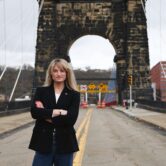SAN FRANCISCO (CN) — A Ninth Circuit panel on Wednesday entered San Francisco’s battle with a coalition of unhoused people who say the city’s ban on resting on public streets violates their civil rights.
San Francisco leaders want the panel to lift or modify U.S. Chief Magistrate Judge Donna Ryu's injunction of ordinances that allow for the removal of unhoused people and encampments from public property. Ryu ruled this past December that San Francisco officials cannot threaten enforcement of "sit/lie" or public sleeping laws against involuntarily homeless individuals — meaning people who do not have access to shelter or permanent housing.
Then in January, Ryu found the city does not have enough shelter beds for all unhoused residents. According to the 2022 San Francisco Homeless Count there were 7,754 homeless people living in the city in February 2022. In 2021, the city had only 5,080 shelter beds.

An hour before Wednesday's oral arguments, more than 70 people surrounded the courthouse — one side in support of the injunction, the other asking the Ninth Circuit panel to lift it so the city can move unsheltered people away from homes and businesses.
"It’s been seven months since the injunction was issued, and we have no insight into how the city has sought to comply with the injunction," Jeffrey Kwong of the Harvey Milk LGBTQ Democratic Club said. "They’re still displacing people, they’re threatening them with arrest and they’re destroying their property.”
Several feet away, groups opposing the injunction, like Together SF and Rescue SF, said the city should be able to move people.


“We feel so powerless,” Andrea Aiello, of the Castro Community Benefit District, said. “There’s not enough shelter beds, there’s not enough on-demand substance abuse treatment.”
However, her groups’ side was joined by some of the city’s most powerful authorities, including Mayor London Breed.
In a video on X — formerly Twitter — captured by the San Francisco Chronicle, Breed said the city is prepared to take the case all the way to the U.S. Supreme Court.

“‘Anything goes in San Francisco’ is not the way!” Breed shouted. “We have seen people in really awful conditions, and we are not standing for it anymore! I am sick and tired of being sick and tired.”
In court, U.S. Circuit Judges Patrick Bumatay, a Donald Trump appointee, and Lucy Koh and Roopali Desai, both Joe Biden appointees, emphasized that they cannot resolve the case. Instead, they will only answer the narrow question of whether Ryu’s preliminary injunction against San Francisco is justified.
San Francisco filed the appeal to clarify the court’s definition of “involuntarily homeless," deputy city attorney Wayne Snodgrass told the panel. He said the city has created thousands of new shelter beds since 2019.
“We need only look out the windows of this courthouse to see the dismal conditions that are now present on San Francisco's sidewalks,” he said. “This is a crisis, and it’s one that the city expends enormous resources to address.”
Snodgrass said Ryu’s injunction is so vague that the city cannot enforce any ordinances regarding public resting on property “because we don't want to be in violation of a federal injunction.” He said San Francisco’s ordinances are different from those cited in the landmark case Martin v. Boise, which bars cities without enough shelter beds from moving unhoused people, because the city allows people to sleep in public during certain hours.
Koh said she thought the injunction was specific about the city's enforcement of five pieces of its ordinances. However, she said, “There does seem to be a lot of confusion about whether someone who refuses shelter is involuntarily homeless.”
Arguing for the plaintiffs, attorney Joseph Lee said the city has plenty of guidance for how it can enforce the ordinances with people who decline shelter options.
The plaintiffs say the city’s current shelter waitlist has more than 400 people waiting for a shelter bed. Lee told the panel the city has not provided evidence that officials offer people shelter before moving them from city streets, and Ryu's injunction considered the city's record of applying its ordinances.
"The factual record shows the city has engaged in widespread constitutional misconduct. The city is free to go back to the district court and ask for a modification of the injunction,” he said.
Desai asked if the city could create a designated space where people can go to be offered shelter options. Lee said the city can ask people to move in many circumstances, such as during cleaning operations or when people block the sidewalk.
On Thursday, Ryu will hear the plaintiffs’ motion to enforce the preliminary injunction.
“We would rather the district court deal with it, rather than have to deal with that motion,” Bumatay said.
Subscribe to Closing Arguments
Sign up for new weekly newsletter Closing Arguments to get the latest about ongoing trials, major litigation and hot cases and rulings in courthouses around the U.S. and the world.








